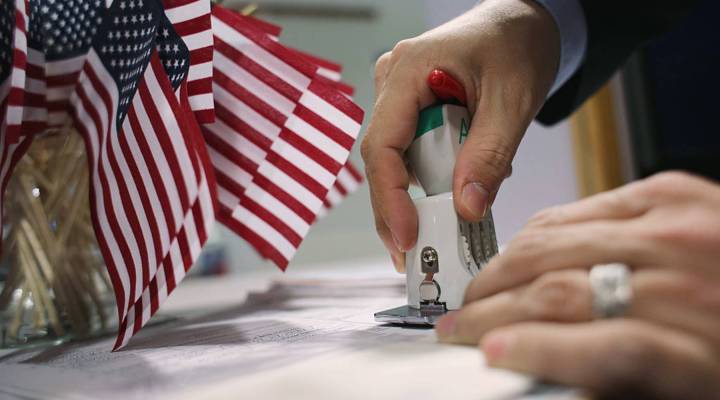
Employers struggle to make H-1B visas work

There’s really no polite way to say this. When it comes to the H-1B system, the tech industry is pissed off.
“You know the fantasy of the H-1B opposition is that we’ll just hire more out-of-work coal miners and bring them to New York. And it’s not possible,” said Amol Sarva, a New York-based entrepreneur who’s helped found multiple startups, including Peek and Virgin Mobile USA. “They don’t have the skills or network or knowledge or background,” he said.
There are a lot of disagreements surrounding H-1Bs. Critics say jobs that should go to Americans are given away to cheap foreign labor. But Sarva said creating jobs is hard to do when you can’t hire the workers you need. Even worse, the rules surrounding H-1Bs are complicated. It’s so bad that when I call the U.S. Citizenship and Immigration Services Office to clarify the rules, the spokesperson there gets something wrong. She says when workers lose their visas, they have 10 days to leave the country, when really it’s 60.
- RELATED: What it’s like to live and work in H-1B visa limbo
- Indians worry about U.S. degree prospects under Trump
- Some economic context for the immigration debate
And with President Donald Trump’s recent executive orders on immigration, what once seemed merely complex and onerous became labyrinthine and even threatening.
“We had to set up a separate hotline that was receiving phone calls about 18 hours of the day,” said Ian Macdonald, an immigration attorney with Greenberg Traurig, a law firm with offices around the globe. “Companies are wringing their hands. They’re frustrated. The companies we work with are just looking for simple guidance from the government. They want to be able to plan.”
Virtually all of his clients, when faced with the hassles of applying for and maintaining H-1B status, would prefer to hire American, Macdonald said. But the perceived level of difficulty associated with the H-1B program can vary depending on the size of the firm. Just take the Protect and Grow American Jobs Act. One of three new bills proposed to overhaul the H-1B system, it would see the minimum wage paid to H-1B workers raised from $60,000 to $100,000 a year.

Amol Sarva has helped found multiple startups.
“The very large, well-known IT companies, quite frankly, wouldn’t bat an eyelid at paying higher filing fees, paying increased salaries, if it means they can get the employees they deem necessary for their operations,” Macdonald said. Instead, it’s the small to midsize companies that are worried.
“The H-1B visa program is a one-size-fits-all. And that’s problematic,” said Daniel Aobdia an accounting professor who studies H-1Bs at Northwestern University’s Kellogg School of Management.
The system is lottery based and companies have to pay the filing fee, up to $4,000 per applicant, to enter. But last year the program was oversubscribed. Triple the number of applicants applied. Chances of getting your application picked were only about one in three. The office of U.S. Citizenship and Immigration Services says when an application isn’t selected, filing fees are refunded, but that doesn’t include legal fees, lost time or the loss of an employee you need.
“Right now the current system privileges certain kinds of companies over other ones,” Aobdia said. Large ones. And small companies that really need one or two special workers can be left facing the difficult decision of whether or not to participate in an expensive gamble.
“We didn’t win the lottery. I mean literally. We did not win the lottery,” said Ben Waber, CEO, co-founder of Humanyze, a small tech startup in Boston that analyzes productivity.
Waber is frustrated. His company uses sensors and digital data to better understand how employees collaborate and interact in the workplace. He said the workers he needs are hard to come by.
“Literally in our field, there are about three, four dozen people outside my company who can do what we do. Globally,” he said.
“Innovation doesn’t happen along these boundaries that are so incredibly scripted by the government,” said Sarva, the New York entrepreneur.
The threat to the U.S. economy doesn’t come from hiring skilled foreign workers, Sarva said. “Far more real is, if you can’t get visas, you just open an office overseas,” he said.
That’s a decision Waber may be forced to make. “At a fundamental level, businesses need two things to operate in a stable fashion: a stable labor pool and stable regulations,” he said. “And the current administration has thrown both of those really into disarray.”
If his employees don’t get their visas next time, Waber is prepared. He’s started pricing office space in Japan and Canada.
There’s a lot happening in the world. Through it all, Marketplace is here for you.
You rely on Marketplace to break down the world’s events and tell you how it affects you in a fact-based, approachable way. We rely on your financial support to keep making that possible.
Your donation today powers the independent journalism that you rely on. For just $5/month, you can help sustain Marketplace so we can keep reporting on the things that matter to you.


















